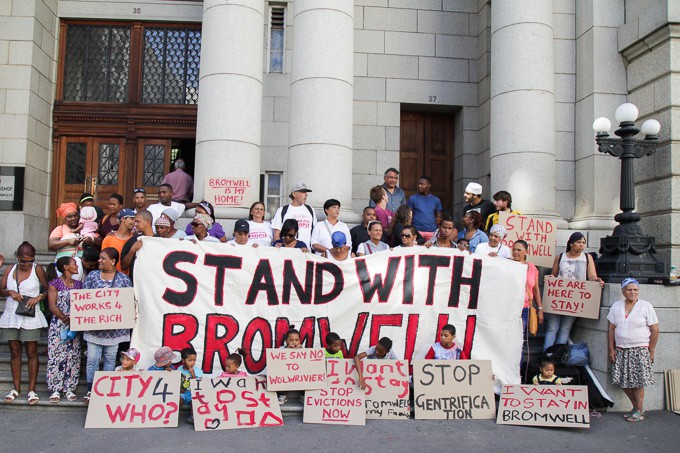Judge urged to visit Wolwerivier
Court hearing on Bromwell Street residents ends
“Go and see it judge,” called an activist from the gallery, urging Acting Judge Leslie Weinkove to view the desolate Wolwerivier settlement for himself before deciding that it fulfilled the requirements of “reasonable” emergency housing as near as possible to the Bromwell Street residents’ current homes in Woodstock.
Today was the second day of the hearing in which the residents want to compel the City to provide them with “reasonable” emergency accommodation close to their current homes. The City is offering accommodation in Wolwerivier, an incremental development area nearly 30km from the city.
According to the applicants’ heads of argument the residents believe that the City’s provision of emergency housing in Wolwerivier is “inflexible, unreasonable and unconstitutional”. The residents argue that the City has failed to take into account their actual situations and has failed to consider any alternative measures other than providing them with emergency housing at Wolwerivier.
Advocate Karrisha Pillay for the City argued that Wolwerivier was the closest emergency housing available. She said that none of the sites listed by the applicants as relocation possibilities were viable as emergency housing options. “In many instances that land [identified] actually belongs to the Provincial Department of Public Works. Some have electric substations [on the land], some parking lots, and some are too small,” said Pillay.
She said that even if there was land available, the proper processes would have to be followed and it might not even be given to the Bromwell residents.
“[The residents] have no constitutional right to choose the location at which they want to live,” said Pillay.
When Pillay turned to resident Charnell Commando’s affidavit on available land in the Woodstock area, Weinkove again questioned, as he had yesterday, how Commando had the expertise to identify such parcels of land.
“She is not an expert,” said Weinkove. “What do I do with this kind of affidavit?”
He said he did not see how “this person could possibly tell that these are parcels zoned for residential use and are suitable for development”.
In her arguments Pillay also emphasised that emergency housing was not a substitute for a permanent housing project and that it would not meet the same standards.
In addition Pillay wanted to know what the impact would be if Weinkove granted the application. She questioned whether this would suggest that the applicants had some kind of “right or entitlement” and said that it would create a “great disparity in terms of the delivery of housing”.
“[It would be a] gross unfairness to persons living in abject poverty, in informal settlements patiently awaiting their turn,” said Pillay.
On the other hand, Advocate Sheldon Magardie for the residents said that Weinkove needed to consider the individual circumstances of the residents and that the City should respond flexibly to the situation instead of applying policy rigidly.
He also questioned Pillay’s argument as to why emergency housing couldn’t be built in the immediate city centre and surrounds. Pillay had said that the costs were “at least three fold” compared to building further afield. The rates were high in the city centre and there were competing demands for the land such as social housing programmes in the city. Magardie said that the city needed to provide “a specific solution for a specific situation”.
Ross Randell for the Woodstock Hub told the court that the Bromwell Street property was costing the Woodstock Hub R50,000 a month as the property was acquired by way of a loan and the Woodstock Hub has had to continue to pay utilities without receiving rent.
Weinkove also wanted to know from Randell what the company would be doing with the building. When he was told that the Woodstock Hub intended to demolish the building and build residential units, Weinkove asked whether this would house more people than are currently living there.
It has been reported that the flats will be rented out at about R9,000 per month, an amount which is out of reach for the current tenants.
Both the City and the Woodstock Hub have asked for the residents to pay the costs of the court application. Randell also added that the crowdfunding that the Woodstock Hub had previously secured to aid the residents in finding accommodation was no longer available.
It is unclear how the residents would pay these costs, as many are unemployed.
Magardie asked for the City to pay costs and if the court ruled against the residents he asked that there be no costs awarded against the applicants.
Weinkove reserved judgement.
This article was updated with additional information after publication.
Next: 90% matric pass rate for Pietermaritzburg school where students sit on buckets to study
Previous: “We have failed” admits SASSA
© 2017 GroundUp. 
This article is licensed under a Creative Commons Attribution-NoDerivatives 4.0 International License.
You may republish this article, so long as you credit the authors and GroundUp, and do not change the text. Please include a link back to the original article.



